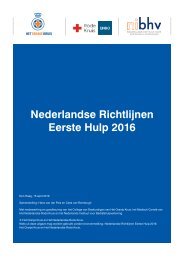Thesis-Anne-Vos-Masters-SBR-and-EU-Law-3
Thesis-Anne-Vos-Masters-SBR-and-EU-Law-3
Thesis-Anne-Vos-Masters-SBR-and-EU-Law-3
Create successful ePaper yourself
Turn your PDF publications into a flip-book with our unique Google optimized e-Paper software.
Gas is currently in development. In Dutch case law the adoptive licensing approach is always<br />
referred to when it comes to the precautionary principle. It is possible that the Minister of Economic<br />
Affairs will include such a monitoring plan in the Structure Vision. This is however not without risk,<br />
since it is arguable that the CJ<strong>EU</strong> will not accept the accordance of such a monitoring plan with the<br />
precautionary principle. It is however a way to take account of the precautionary principle.<br />
The next environmental principle that was set out concerned the prevention principle. Although<br />
this principle should be distinguished from the precautionary principle, they are almost always<br />
invoked at the same time in practice. An important note that has been stated is that the Dutch<br />
upcoming regulation (the Draft MSL) seems to be contrary to the prevention principle. While the<br />
principle requires competent authorities to be open-minded, the Minister of Economic Affairs has<br />
not shown such an open view in the Draft MSL. The proposed zones for possible shale gas<br />
extraction are only reviewed against the current Dutch regulation <strong>and</strong> the Model PMV. However,<br />
the prevention principle requires competent authorities to look further than the existing concepts or<br />
lists. In this manner, the Minister could have excluded the boring free zones (from shale gas<br />
activities) in the Draft MSL. This would have enhanced the protection of the drinking water areas.<br />
Moreover, it could have contributed to the public acceptance. The Minister would have shown its<br />
willingness to protect the environment <strong>and</strong> the drinking water areas.<br />
Finally, the concept of sustainable development was discussed. Here, special attention was paid<br />
to the sustainable impact assessment, which is based on several policy guiding principles. After<br />
carrying out this assessment, it was clear that the execution hereof depends on many political<br />
aspects. It moreover depends from which perspective this assessment is carried out. Some<br />
questions of the assessment were not debatable, such as the fact that shale gas extraction comes<br />
with negative consequences for certain policy objectives (e.g. the high level of quality of the<br />
environment) <strong>and</strong> the fact that there is (much) scientific uncertainty about the existence or extent of<br />
risks to e.g. public health, safety <strong>and</strong> the environment. However, the questions concerning the<br />
used BAT <strong>and</strong> the sincere balancing act were less obvious. Here it depends whether this is argued<br />
from the perspective of e.g. a NGO or the Minister of Economic Affairs or permit holders. These<br />
questions are difficult to answer because there is no priority-rule between environmental, social<br />
<strong>and</strong> economic aspects. However, with regard to shale gas extraction, it is very well arguable,<br />
especially when taking into account the serious or even irreparable dangers for drinking water <strong>and</strong><br />
the environment <strong>and</strong> the fact that there are not alternatives, but also the issue of public acceptance<br />
(which are all policy guiding principles), that there is not a sincere balancing act.<br />
Addressing the problems<br />
During this thesis, several problems were pointed out; in Chapter 2 several risks <strong>and</strong> concerns<br />
were expressed <strong>and</strong> in Chapter 4 <strong>and</strong> Chapter 5 different issues with regard to the (current <strong>and</strong><br />
upcoming) regulation on shale gas were set out. As already seen in Chapter 6, many of those<br />
problems can (at least partly) be resolved by a stricter or more consequent application of the<br />
general <strong>and</strong> environmental principles discussed here. These problems will be shortly iterated here<br />
individually, after which it will be shown that the principles will help to address these problems.<br />
The main problems are the following: the fragmented nature of shale gas regulation (not only the<br />
regulation, but also the competent authorities, the assessment frameworks, the instruments <strong>and</strong><br />
the protection levels), the lack of public trust <strong>and</strong> acceptance (due to many risks <strong>and</strong> uncertainties<br />
accompanied with shale gas activities), the problem of conflicting interests (mainly between<br />
drinking water <strong>and</strong> energy supply), the environmental concerns (water quality, air emissions,<br />
seismicity), the protection of drinking water <strong>and</strong> the issue of overriding authorities. Before<br />
discussing the different problems, it should be noted that the concept of sustainable development<br />
includes many of the discussed principles (which might contribute to the problems) as guiding<br />
policy principles (such as the open <strong>and</strong> democratic society, the involvement of citizens, the policy<br />
98



